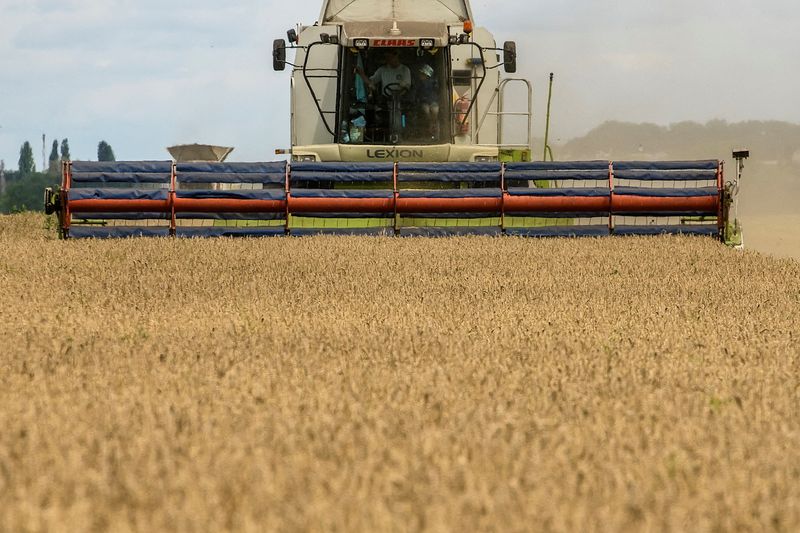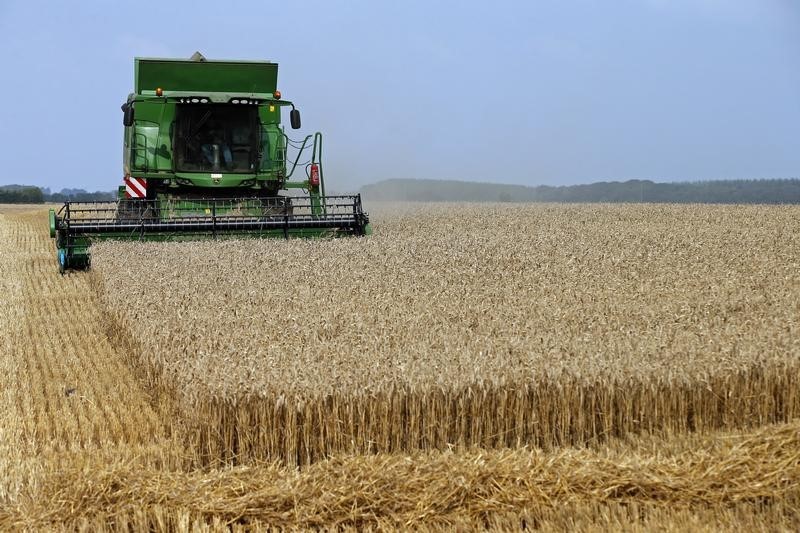By Pavel Polityuk, Maytaal Angel and Nigel Hunt
KYIV/LONDON (Reuters) - War, rain and economic hardship have depressed Ukraine's wheat plantings, depriving the nation of vital export earnings in 2023 and heralding another year of tight global supplies and potentially high prices for basic foodstuffs.
Ukraine is one of the world's top wheat exporters with key buyers including Egypt, Tunisia, Morocco, Indonesia, Pakistan and Bangladesh, and a further drop in production will leave many scrambling to find alternative supplies.
The race to secure grain is likely to drive up global prices, even hitting importers who don't buy directly from Ukraine.
Ukraine harvested around 19 million tonnes of wheat this year, down more than 40% from the previous season's record of 33 million tonnes and a further sharp drop in production looks inevitable in 2023, analysts said.
In a further blow to production prospects, cash-strapped farmers in Ukraine are also reducing use of vital crop inputs such as fertilisers. Less fertiliser means lower yields for the farmers that do plant.
"Farmers prefer to see what happens next year so did very little planting in the fall. People just want to wait and see what happens, sit on the money, maybe they don't have money, there are different reasons," Kees Huizinga, a Dutch national who runs a 15,000 hectare dairy and crop farm in central Ukraine.
The drop in production will affect some of the world's poorest countries. Ukraine exports some wheat to Turkey where it may be processed into flour and shipped to Africa, particularly sub-Saharan Africa, and also into soft wheat-based pasta which is popular among consumers in developing countries owing to more affordable prices compared to the pasta made from durum.
The Agricultural Market Information System (AMIS), which was set up by G20 members to strengthen global food security, has warned another poor crop in Ukraine would mean global stocks would not recover for at least another year, ensuring prices remain high and markets volatile.
The food crisis also coincides with continued economic fallout from the COVID-19 pandemic, climate shocks and high energy prices.
"I fear that higher food prices are here to stay not only because of the problems in Ukraine. All other producers are facing high fertilizer, fuel, labour and transportation costs," analyst Georgi Slavov of broker Marex Solutions said.
In contrast, prices the farmers receive in Ukraine remain very low due to the difficulty and high cost of moving crops across the war-torn country to export hubs.
"Everyone is saving money and planting with minimum costs (including less fertiliser use), which leads to a very significant drop in yield next year," Dmitry Skornyakov, chief executive of Ukraine farm company HarvEast said.
Alexander Karavaytsev, a senior economist at the International Grains Council, said lower fertilizer application could also have an adverse impact on the quality of the crop.
"It is understood that soils in Ukraine have some buffer owing to investment by farmers in previous years, and Chernozems (black soils) are the world’s most fertile soils," he said.
"Still, quality can be affected by persistent reduced fertilizer application rates."
(Graphic: Ukraine domestic versus international grain prices: https://fingfx.thomsonreuters.com/gfx/mkt/jnvwygmqlvw/Screenshot%20Ukraine%20grain%20prices.png)
LOWER EXPORT EARNINGS
A sharp drop in production is also likely to mean Ukraine's wheat export revenues fall far below the roughly $4 billion in the 2021/22 season, according to Reuters calculations.
Farmers had sown 3.6 million hectares of winter wheat, as of Nov. 7, down 41% from 6.09 million at the same stage a year ago, government data shows.
Ukraine sowed around 6.1 million hectares of winter wheat for the 2022 harvest, but a large area has been occupied by Russian forces since they invaded Ukraine in February and only 4.6 million hectares were harvested.
"It's a triple effect of weather, economic and technical factors (such as the inability to access fields)," said Sebastien Poncelet, analyst at Agritel, a French crop consultancy which has a Ukrainian office, referring to the drop in planted area.
In contrast to wheat, rapeseed plantings have held up well.
"Rapeseed got sown. It's down a bit but reasonable. We think about 1 million hectares were sown compared with 1.15-1.3 million usually," Poncelet said.
The cost of transporting crops to Europe are very high but these represent a much smaller percentage of the value for rapeseed, which can be sold at roughly twice the price of wheat once delivered to the European Union.
"Rapeseed generates more cash. If you can get one lorry dispatched from the farm, there's more money than with cereals.
Rapeseed is offering good margins," Poncelet added.
(Graphic: Ukraine winter wheat plantings Ukraine winter wheat plantings: https://graphics.reuters.com/UKRAINE-CRISIS/dwpkdgwxevm/chart.png)
SPRING OILSEEDS FAVOURED
Ukraine is expected to see similar shifts in the upcoming spring planting season, with corn the main grain crop sown and sunflowers the main oilseed.
"Spring might look the same as the fall," Huizinga said, noting there could be less plantings of grains and a similar area for oilseeds.
Prospects, however, also hinge on whether it is possible to export from Ukraine's ports under a United Nations-led pact which was signed on July 22 but is due to expire on Nov. 19.
The agreement allows for agricultural products to be exported from three Ukrainian ports and there are hopes that it will be extended despite some reservations from Russia about how the pact is working.
Without it prices within Ukraine are likely to fall further, particularly in eastern and central Ukraine as it will only be possible to export through land routes which run from western Ukraine into the European Union.
"Much depends on the ability to export by sea. In fact, one of the reasons for the decrease in sown areas this autumn was the lack of funds for farmers due to the inability to sell grain at (global) market prices," said Denys Marchuk, deputy chair of the Ukrainian Agrarian Council.

"If the export by sea from Ukraine does not work we will see a decrease in the number of crops. I think that corn will decrease first of all," he added, noting he believed the grains initiative would continue.
(Graphic: Ukraine winter rapeseed plantings Ukraine winter rapeseed plantings: https://graphics.reuters.com/UKRAINE-CRISIS/zdvxdyzmgvx/chart.png)
